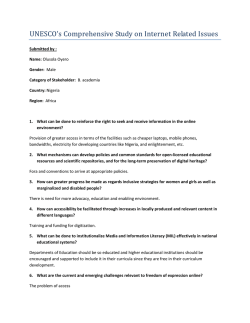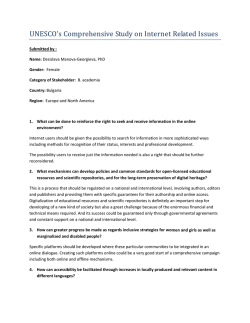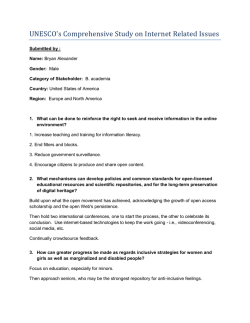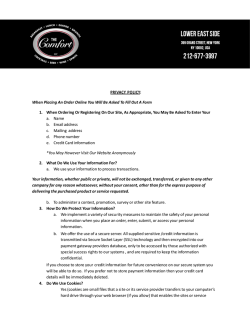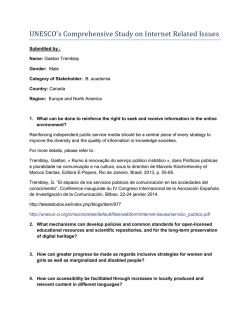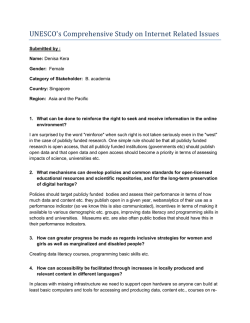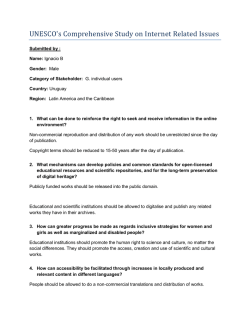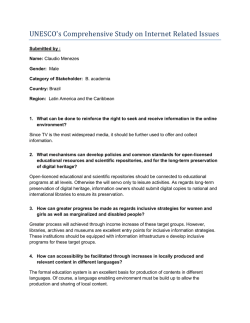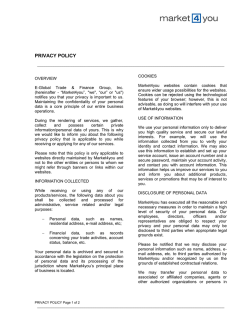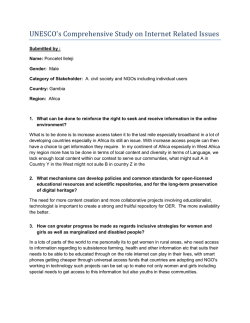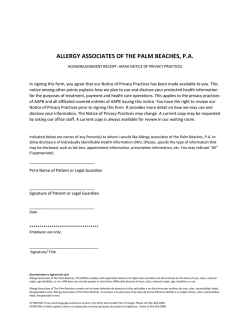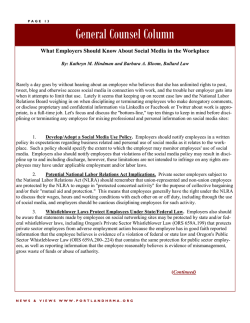
Adrian Schofield
UNESCO'sComprehensiveStudyonInternetRelatedIssues Submitted by : Name: Adrian Schofield Gender: Male Category of Stakeholder: B. academia Country: South Africa Region: Africa 1. What can be done to reinforce the right to seek and receive information in the online environment? Include it as a basic human right ‐ the right to food, water, shelter, health care and sharing information. 2. What mechanisms can develop policies and common standards for open‐licensed educational resources and scientific repositories, and for the long‐term preservation of digital heritage? Promote academic and educational networks ‐ high bandwidth, low cost. Reward tertiary institutions which join in and create/maintain repositories. 3. How can greater progress be made as regards inclusive strategies for women and girls as well as marginalized and disabled people? Put more women in executive positions. As long as men are in the most senior posts, they will tend to exclude women. 4. How can accessibility be facilitated through increases in locally produced and relevant content in different languages? Create the content, make it interesting and people will demand access. 5. What can be done to institutionalize Media and Information Literacy (MIL) effectively in national educational systems? What is MIL? Don't use acronyms. 6. What are the current and emerging challenges relevant to freedom of expression online? No new challenges. Whoever does not like what you say will try to find a way to prevent you saying it. People are getting better at finding ways around the blockages. 7. How can legislation in a diverse range of fields which impacts on the Internet respect freedom of expression in line with international standards? If a national constitution does not guarantee freedom of expression there is no point in looking for other legislation. 8. Is there a need for specific protections for freedom of expression for the Internet? No. Freedom of expression must a a right, regardless of the medium. 9. To what extent do laws protect digitally interfaced journalism and journalistic sources? See above. The medium is irrelevant to the right. Of course, it does assume that journalism is ethical, which often it is not. 10. What are the optimum ways to deal with online hate speech? How can Media and Information Literacy empower users to understand and exercise freedom of expression on the Internet? Remove it and prosecute the author and publisher. 11. What are the optimum systems for independent self‐regulation by journalistic actors and intermediaries in cyberspace? Clinging vainly to the hope that there are some ethical and moral standards in the "profession". 12. What principles should ensure respect for the right to privacy? "Do as you would be done by". 13. What is the relationship between privacy, anonymity and encryption? Privacy is a right. Anonymity is a shield. Encryption is a tool. 14. What is the importance of transparency around limitations of privacy? Breach of privacy must be substantiated with evidence of transgression. 15. What kinds of arrangements can help to safeguard the exercise of privacy in relation to other rights? All rights are exercised in balance. Rights cannot be exercised without compromise. 16. How can openness and transparency of data be reconciled with privacy? Why is "data" open and transparent? It does not lie around like grains of sand, to be picked up and carried away. It belongs to someone who may decide to share it but must do so with regard to the rights of any stakeholders with a(partial) interest in the data. 17. What may be the impact of issues relating to big data on respect for privacy? The size/volume of the data has no bearing on the issue. 18. How can security of personal data be enhanced? Better encryption. 19. How can Media and Information Literacy be developed to assist individuals to protect their privacy? Basic education curricula must include the topic. 20. How can ethical principles based on international human rights advance accessibility, openness, and multi‐stakeholder participation on the Internet? If they can be applied, the rest will follow. Getting humans to behave ethically is the challenge. 21. What conceptual frameworks or processes of inquiry could serve to analyse, assess, and thereby inform the choices that confront stakeholders in the new social uses and applications of information and knowledge? Cart before the horse. People will learn by experience. Let them. 22. How does ethical consideration relate to gender dimensions of the Internet? Aargh! It doesn't. Gender discrimination isn't a matter of ethics. It's far more basic. 23. How can ethics, ‐ i.e. the simultaneous affirmation of human rights, peace, equity, and justice ‐ inform law and regulation about the Internet? If we were ethical, we would not need laws. 24. What international, regional and national frameworks, normative guidelines and accountability mechanisms exist of relevance to one or more fields of the study? Too many to mention and many are uncoordinated. ISOC, ICANN... 25. How do cross‐jurisdictional issues operate with regard to freedom of expression and privacy? Keep your data where the jurisdiction is most likely to protect you. 26. What are the intersections between the fields of study: for example, between access and freedom of expression; ethics and privacy; privacy and freedom of expression; and between all four elements? No answer. 27. What pertinent information materials exist that cut across or which are relevant to the four fields of the study? No answer 28. What might be the options for role of UNESCO within the wider UN system in regard to the distinct issues of online Access to information and knowledge, Freedom of Expression, Privacy and Ethical dimensions of the information society? Promote rights in the GA. 29. What might be options for the role of UNESCO in relation to stakeholders outside the UN system? 30. For each study field, what specific options might UNESCO Member States consider? No answer
© Copyright 2026
